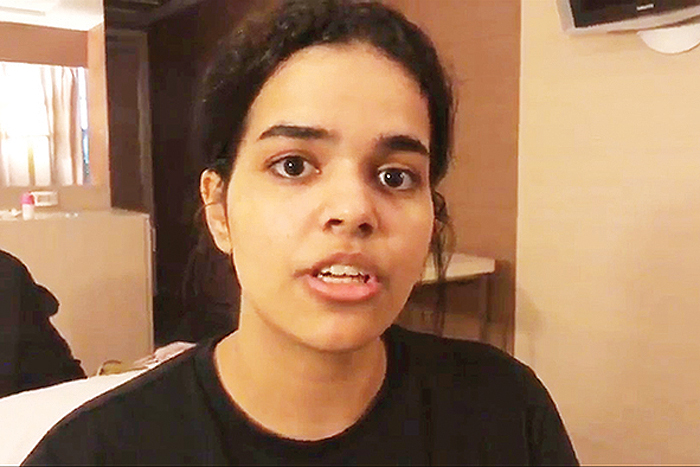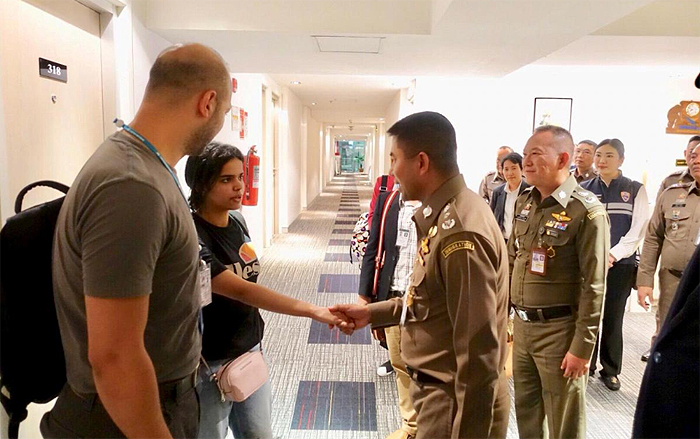
BANGKOK: The father of an 18-year-old Saudi woman asylum seeker who fled to Thailand saying she feared her family would kill her, has arrived in Bangkok and wants to meet his daughter, Thailand's immigration chief said yesterday. But Rahaf Mohammed Al-Qunun's father and brother would have to wait and see whether the UN refugee agency would allow them to see her, immigration chief Surachate Hakpan said. "The father and brother want to go and talk to Rahaf but the UN will need to approve such talk," Surachate told reporters.
The UN refugee agency yesterday said it was investigating Qunun's case after she fled to Thailand saying she feared her family would kill her if she were sent back to Saudi Arabia. Activists are concerned about what Saudi Arabia will do after Thai authorities reversed a decision to expel her and allowed Qunun to enter the country under the care of the UNHCR. "The father is now here in Thailand and that's a source of concern," Phil Robertson, Human Rights Watch's deputy director for Asia, told Reuters. "We have no idea what he is going to do … whether he will try to find out where she is and go harass her. We don't know whether he is going to try to get the embassy to do that."
Qunun is staying in a Bangkok hotel while the UNHCR processes her application for refugee status, before she can seek asylum in a third country. UNHCR staff were interviewing her yesterday after meeting her the day before. "It could take several days to process the case and determine next steps," UNHCR's Thailand representative Giuseppe de Vincentiis said in a statement. "We are very grateful that the Thai authorities did not send back (Qunun) against her will and are extending protection to her," he said.
The case has drawn new global attention to Saudi Arabia's strict social rules, including a requirement that women have the permission of a male "guardian" to travel, which rights groups say can trap women and girls as prisoners of abusive families. It comes at a time when Riyadh is facing unusually intense scrutiny from its Western allies over the killing of journalist Jamal Khashoggi at the Saudi consulate in Istanbul in October and over the humanitarian consequences of its war in Yemen.
'Family matter'
Qunun told the world of her dramatic plight on social media, drawing widespread support and concern, which convinced Thai authorities to back down from deporting her back to Saudi Arabia. She was finally allowed to enter Thailand late on Monday after spending 48 hours at Bangkok airport, some of it barricaded in a transit lounge hotel room. Lawmakers and activists in Australia and Britain have urged their governments to grant asylum to Qunun.
The Australian government said it had asked Thailand and the UNHCR to process Qunun's claim quickly, and it would consider her application for a humanitarian visa once the UNHCR had made its decision Saudi Arabia's embassy in Thailand denied reports that Riyadh had requested her extradition. "The Kingdom of Saudi Arabia has not asked for her extradition. The embassy considers this issue a family matter," the embassy said in a post on Twitter.
In an earlier and separate explanation released on Twitter, the embassy also denied sending officials to Suvarnabhumi airport to meet Qunun as she arrived or impounding her passport - as she alleged. It also said the embassy had made contact with her father, a senior regional government official in the kingdom, "to inform him on her situation". The Thai immigration police released photos of Surachate and his team sitting down with Saudi embassy charge d'affaires Abdalelah Mohammed Alsheaiby.
The Thai immigration chief said on Monday the embassy had alerted Thai authorities to the case, and said that the woman had run away from her parents and they feared for her safety. A woman in Britain had launched an online petition calling on Foreign Secretary Jeremy Hunt to grant Qunun asylum and issue her an emergency travel document. Within hours of launching the petition it had secured thousands of signatures. - Agencies










